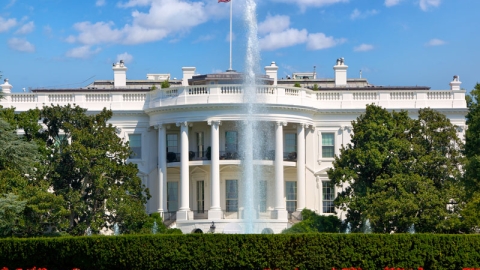
A Contentious Campaign
November 7, 2016
Array
We asked the leaders of Bucknell’s on-campus Democratic, Libertarian and Republican organizations to share their thoughts on the dueling candidates in this unprecedented presidential election. What they had to say was not entirely predictable. Read on and see what we mean.
By Tom Ciccotta '17, Brady Clapp '17 and Chris Shadek '17
Vote for Change
By Chris Shadek '17
The way citizens of the United States choose their leader every four years, peacefully changing the direction of our country, sets America apart from other nations. When Americans are unhappy with their situation, they vote for change. This happened in 1976 with Jimmy Carter, 1980 with Ronald Reagan, 1992 with Bill Clinton and, in 2008, with Barack Obama. Today, many Americans are again unhappy with the current state of affairs and are seeking a new president who will bring about major changes.
If elected, both Hillary Clinton and Donald Trump would show great respect for the presidency and would act responsibly, despite some of their campaign theatrics. While their behavior is entertaining at times, it is not a good basis upon which to cast our ballots. It is their goals, policies and plans that will shape the presidency and the country in the future.
When we vote on Nov. 8, let’s move beyond the hoopla and recognize that we really have a binary choice, despite the existence of two other candidates. Gary Johnson, who is running as a Libertarian, and the Green Party’s Jill Stein, while interesting and perhaps aligned perfectly with some individuals’ personal views and desires, are not going to win the presidency. Votes for these candidates will only indirectly lend support to Trump or Clinton.
And while the primary season made for high television ratings, to vote this fall based solely on the rather amusing and entertaining politics of the primary campaign, without considering the goals, policies and plans of the general-election candidates, would be very shallow and nearsighted on the part of voters. So let’s make the responsible choice and decisively cast a vote for Clinton or Trump.
My generation, the millennials — and, in fact, all Americans — need to move beyond the theatrics of the primaries and recognize that our system of government is broken and ineffective. We need to elect a different type of leader — one who will challenge the status quo in Washington and who will work collaboratively with other leaders to move America in the right direction.
During the last year, I have heard many people ask, “Why are people voting for Trump?” and, “Why do some people feel so passionately about Trump?” Maybe it is because his underlying message, “Make America Great Again,” is actually very optimistic.
Is it possible that the millennials might support an unorthodox candidate like Trump? Results of a Sept. 8–13 Quinnipiac University poll of likely voters under age 35 showed a relatively similar preference for Clinton (31 percent) and Trump (26 percent) when Johnson and Stein were included in the question. When Obama ran in 2008, he received 66 percent of the under-30 votes (according to the Pew Research Center). However, in 2016, many millennials (43 percent in the September Quinnipiac poll) indicated they would support candidates who will not win in the general election.
When you cast your vote Nov. 8, ask yourself, “Will Clinton or Trump be most effective in helping our country become more prosperous? Safer? More highly regarded on the world stage? More innovative? And who will be most able to shake things up in Washington and make government more efficient so that it can serve us, rather than we serving it? Who can reduce the bureaucracy in Washington? Who can work with other global leaders to level the playing field so our workers can compete fairly in the global marketplace?
“Who really asks the hard questions and will be able to change the way government works to provide all U.S. citizens with the types of economic, family and social opportunities that our Founding Fathers desired for all of us?”
Look beyond the gruff, sometimes funny, sometimes confusing persona of Donald Trump, and look deeply into his real experience and success in building a business empire and making the parts of the world that he touched great again. Let’s give this innovative and provocative person a chance to transform America.
Chris Shadek '17, a five-year computer science and engineering and management dual major, is from Kenilworth, Ill. This fall semester he became president of the Bucknell College Republicans. He also served for three years on Bucknell Student Government and is the founder of Vega Connected, a startup that helps students find out what is happening around them.
The Case for Clinton
By Brady Clapp '17
It is rare to witness so many pivotal events in history in such a short span of time: 9/11, the election of President Barack Obama in 2008, the Arab Spring and now the unlikely political rise of Donald Trump. News outlets such as The Economist have ranked a Trump presidency as among the top 10 threats facing the world.
Trump dreams of building a massive wall on our southern border, predicted to cost upwards of $25 billion, despite the fact that most illegal immigration comes from overstayed visas. He has advocated banning Muslims from entering the U.S., and creating a registry for those already living in the country — a suggestion reminiscent of Japanese-American internment during World War II. Trump not only opposes a woman’s right to choose, but has mentioned that women who seek abortions should face criminal prosecution. He “loves” waterboarding and enhanced interrogation and has advocated killing the families of suspected terrorists. Trump even said that he might abandon NATO allies and has actually suggested that Russia launch a cyber attack, an act of war, against the United States. As if that wasn’t enough he disparaged and insulted the family of a fallen U.S. soldier — a Muslim and a Bronze Star recipient — for daring to stand up to him.
If you believe that these radical views pose a significant threat to this country, then you must vote for Hillary Clinton. In this election, the stakes are too high to stay home or cast a protest vote for a third-party candidate who has no chance of winning; these actions only increase the odds of a Trump presidency. Ask yourself if you are willing to elevate a man with outdated, bigoted and anti-intellectual views to the most powerful office in the world.
This is a message that is particularly important for young people, such as the students here on Bucknell’s campus, to take to heart. There are still some millennials who are hesitant about Clinton, many of whom supported Sen. Bernie Sanders in the primary. However, it is important for them to remember the high stakes of this election and how the way in which the new president addresses issues such as student debt, college affordability and economic mobility will affect them. We will have to live with the consequences of this election for decades to come.
I am voting for Hillary, not just against Trump. Hillary has advocated common-sense reforms in the areas of gun control and criminal justice. She will fight to increase the minimum wage and to index it to inflation to maintain its value over time. Hillary will advocate for paid family leave, a woman’s right to choose and increased tuition subsidies at public universities so students can graduate debt free. She will close egregious tax loopholes for millionaires. Hillary has my vote because she will fight for a stronger, fairer and more just country for all Americans, Black and white, rich and poor, gay and straight, man and woman.
Whether you support Hillary or just oppose Trump, the reality is that one of them will become the next president. The best way to defeat Trump is to vote for Hillary. Vote for whomever you want on down-ticket races, but don’t hand the White House to Trump just for the satisfaction of voting Green or Libertarian.
When history books talk about this election, they will either say that America elected a racist, misogynist, anti-intellectual caricature to the most powerful elected office in the world, or they will say that Americans from both ends of the partisan spectrum came together in a rare moment of political unity to stop Trump and all he represented. If you believe in stopping Donald Trump, you must vote for Hillary Clinton.
The stakes are simply too high to do anything else.
Brady Clapp '17 is a political science and economics major from Villanova, Pa. He is the president of the College Democrats.
The End of the GOP
By Tom Ciccotta '17
As a writer for Breitbart News, a conservative and libertarian news service that has received nearly a billion visits since the beginning of 2016, I’ve had an inside look at American conservatism over the months that coincided with the rise of Republican presidential candidate Donald Trump. Although he boasts a significant following of loyal supporters, Trump’s rise to the top of the Republican Party has been so divisive within the GOP that the party might not recover.
Regardless of the outcome of the upcoming general election, the future of American conservatism is now scarred by its warm embrace of Donald Trump and his brand of statism, which Nobel Prize-winning economist and philosopher F.A. Hayek has warned would erode our natural right to self-ownership.
Trump is not politically or philosophically opposed to expanding the size of government. In fact, most of his behaviors and statements, such as his continued endorsement of universal health care, suggest he shares his view on the role of government primarily with the political left.
In addition to his ideological inconsistency, if any of the other candidates who competed for the Republican nomination had behaved like Donald Trump, their campaigns never would have recovered. He made disgusting statements about Fox News anchor Megyn Kelly after their contentious exchange during the first GOP primary debate. He has made disparaging comments about women, Hispanics and Muslims. At a rally, he mocked a disabled reporter who suffers from a congenital joint condition. It’s still hard to understand, but the more insensitive Trump becomes, the more it animates his base.
Despite behavior like this, Trump is the Republican Party’s presidential nominee. However, few Bucknell students who, like me, are self-identifying conservatives, have joined the GOP’s efforts to make President Donald Trump a reality. Most conservative-leaning students rejected him in favor of Sen. Ted Cruz or Sen. Marco Rubio, and many libertarian-leaning students, like me, have come to reject not only Trump, but the GOP all together.
Even though my reputation at Bucknell is perhaps most closely linked to my work as the president of Bucknell’s College Republicans, I am not a Republican, nor have I ever been. The libertarian elements of American conservatism have been subdued by a vicious and blind authoritarianism that has arrived on the right in the form of its crude and insensitive surrogate, Donald Trump.
If you are interested in a new course for the United States, consider principled third-party options Gary Johnson (Libertarian Party) and Jill Stein (Green Party) in November’s general election. Johnson was a successful two-term governor of New Mexico, has scaled Mt. Everest and received more than a million votes as the Libertarian Party’s candidate in the 2012 presidential election. Jill Stein, a Harvard-educated physician, received nearly a half-million votes in the 2012 presidential election as the Green Party candidate, more than any other female general-election candidate.
Although Johnson and Stein differ on many, if not most issues, they both diverge from the major-party candidates in a few important areas. Both candidates desire a more transparent government and have defended NSA whistleblower Edward Snowden. Most important, both Johnson and Stein boast a long-standing commitment to the basic ideological principles of their parties.
It’s unclear what the future holds for the Republican Party, but it’s becoming increasingly more likely that the GOP will long suffer the consequences of allowing Donald Trump to represent its party. Republican President Herbert Hoover was demonized for decades following the Great Depression, which began during his tenure. Because of this, it was 20 years before another Republican was elected president. As a similar fate for the modern GOP becomes increasingly likely, the rest of us might be best advised to start our search for alternatives.
Tom Ciccotta '17 is an economics major from Cherry Hill, N.J., who has served as president of the Class of 2017. Shortly before the magazine went to press, he left the College Republicans’ presidency to lead the Bucknell chapter of Young Americans for Liberty, a national student libertarian organization.

